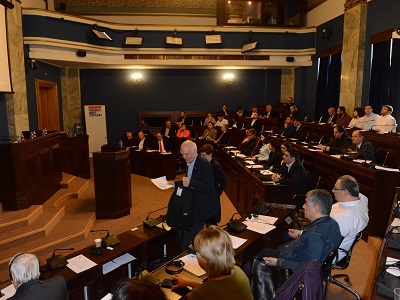On 25 May, 2016 ISET faculty member and head of the Macroeconomic Policy Research Center at ISET's Policy Institute, Dr. Yaroslava Babych, was an invited panel speaker at the conference on Industrial Policy for the Development of Georgia, organized by the Centre for Social Studies of Georgia.
The first half of the conference was devoted to presentations and panel discussions on Georgia’s recent key economic trends, where Dr. Babych presented Georgia’s Trends in Economic Growth based on research conducted by ISET-PI. The main message of the presentation was that the Georgian economy showed remarkable resilience to the outside shocks of 2015. However, the more challenging and long-term issue is the deficiencies in education, which continue to lead to a high rate of self-employment in low-skilled agricultural subsistence farming.
The head of the Industrial Development Group at the Ministry of Economy and Sustainable Development of Georgia, Nugzar Kachukhashvili, spoke about upcoming investment plans, while David Adeishvili, a senior research fellow at the Centre for Social Studies of Georgia, presented the main challenges and opportunities for effective industrial policies in Georgia.
The second half of the conference featured prominent speakers from the Estonian Institute for Future Studies and the London School of Economics (LSE). Dr. Robert Wade, Professor of Political Economy at LSE, discussed the lessons learned for Eastern Europe and Georgia from the development experiences of East Asia. During the presentation, Dr. Wade discussed the merits of two competing approaches to industrial development. In the first instance, the so-called “first best” industrial policy, a country leaves industrial development to market forces, and intervenes only minimally to facilitate development across a broad spectrum of industries. Such an approach, he argued, does not take into account the market failures and bottlenecks standing on the path of nascent industries. The second approach is an activist industrial policy, when a country organises a special department which works closely with specific industry leaders to promote development. Dr. Erik Terk, Professor of Future Studies and Strategic Management at Tallinn University gave a speech in which he compared Georgia's situation with that of Central-Eastern European countries and key lessons for Georgia to learn from.
The conference ended with a fruitful discussion and a question and answer session involving representatives from different governmental and non-governmental organizations of Georgia.











